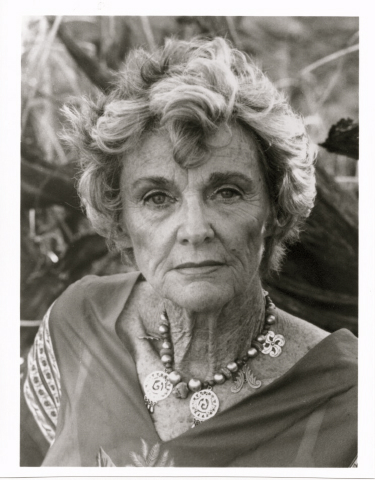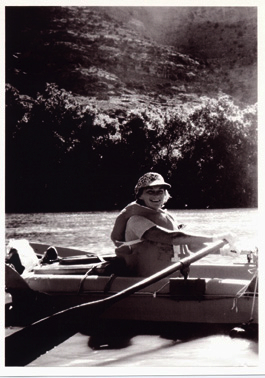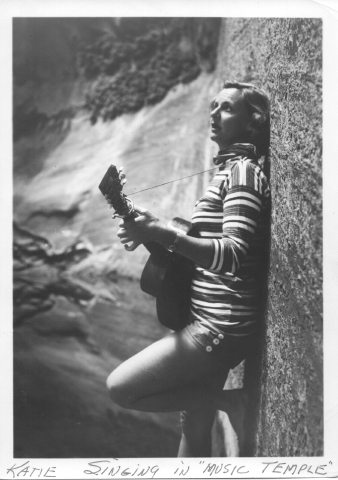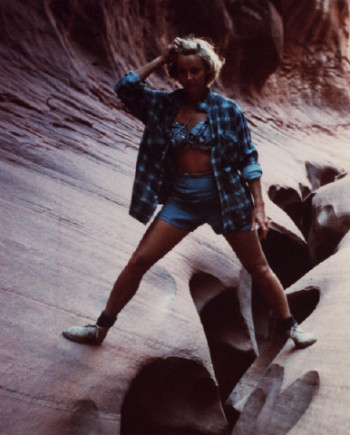Dishing with Katie Lee, Glen Canyon’s Goddess of Dissent

For five decades, Katie Lee has been revered for her unrelenting advocacy against Glen Canyon Dam, draining Powell Reservoir, and letting the Colorado River flow free. A Hollywood actress, traveling folksinger, author, and environmentalist, Katie—now 95 years old—has lived an off-the-beaten-path career led by her brazen spirit, creativity and love for the natural world.
Becoming the third woman ever to run all of the Grand Canyon’s rapids, Katie’s inaugural river run was with Mexican Hat Expeditions—a commercial river running company owned and operated by Frank Wright and Jim Rigg—through Glen and San Juan Canyons in 1953. She rode along as an entertainer, strumming her guitar and singing to passengers on the beaches each night under the stars. “That’s when the 186 miles of pure Eden that is Glen Canyon captivated me and made me its slave,” said Katie. She says that devotion became her plight.

Highly contested, Glen Canyon Dam’s construction began in 1956 and took a decade to complete with several purposes in mind. The dam secures the 1922 Colorado River Compact, which requires the Upper Basin states—Wyoming, Utah, New Mexico and Colorado—to deliver 8.23 million acre-feet (MAF) of water each year to the Lower Basin states of California, Nevada and Arizona, plus Mexico. It also produces hydropower and prevents the possibility of overflow at Hoover Dam. But growing demand for water coupled with steady drought, evaporation, sediment accumulation and bank seepage has nearly metamorphosed the reservoir back into a river. Now, Lake Powell sits at 51% of its capacity, according to September 2015 data from the U.S. Department of the Interior.
Most recently, Katie—who still shines with eloquence and spitfire—was featured in an interview in DamNation, an award-winning documentary that’s helped to recharge the discussion of dam creation and removal in the U.S. Last year alone, 72 dams were removed and 730 miles of streams were restored across the U.S., according to the American Rivers organization.
In honor of our reader’s requests, and as admirers look to Katie and her long-standing torch, we caught up with the fiery performer to speak about her roots, opinions, and advice.
Morgan Tilton: Who inspired your revolutionary spirit and environmental activism?
Katie Lee: It was after I was long inspired that I met the people who could help me along the way. A lot of The Weavers [inspired me] and I knew them all. We all were on the road [performing] already when we met. We were all musicians or artists or environmental people. I never had thought about ‘environmentalism’ as it’s now known, until after I learned that they were going to dam Glen Canyon.
MT: After becoming a Hollywood star, you traveled as a folksinger and lived a more vagabondish lifestyle. That seems like it could be a controversial shift for a woman in the 1950s. How was the transition for you?
KL: It was no big transition at all. I already had [had] the outdoors. When I was a kid, my Dad taught me to hunt with a gun during the war. During the Great Depression—and I’m not sure how my parents did this—my parents gave me a piano and private dance lessons (which drove me nuts.) As soon as I heard the tune I could play it. When my mom found out it was natural for me she just let me alone. I have to thank my parents for being wise enough to let the talents flower on their own.
Hollywood is a fake place; it was harder for me to go to Hollywood. I was used to going out on the weekend to the rivers and being in a trio of two or three guys, and that did not work in Hollywood, deary. I need to be what was natural for me, but I had to be taught and went to a young teacher in Hollywood to learn about myself and my instincts and how to bring them out. The river and [education] helped to make me the person I am today.
MT: What allured you into taking your first river trip down Glen Canyon?
KL: I came home to do a concert, and it was my first appearance in my hometown since I’d left five years earlier. After the concert, my mother gave a party for me out at the ranch, and my friend Ted—who I’d known since I was in high school—brought a 16mm film along of a commercial powerboat run down the canyon.
I said, “Holy mother of Mary, I’ve got to get there, but I can’t!” I wasn’t making enough in Hollywood, even though I’d made great strides. I went back home and around the first of June I got a call around 10 p.m. and Ted said, “You can come, just bring your food and guitar.” And that was how I got there. From there on, I went to Glen Canyon. The following year, I made four or five trips on the Colorado and San Juan rivers singing to the passengers.

MT: Are there circumstances when maintaining or adding dams outweigh the potential consequences?
KL: There are good dams, of course—for irrigation for farmlands and things like that—but I can’t give you all the reasons for all the dams. I’m an artist not a politician. Hoover Dam was built for the right reasons and in the right place.
I know that that Glen Canyon Dam was built in the wrong place for the wrong reasons. It’s nothing but a cash register. There are many dams all over the country like that. When you kill a river, you destroy the ecology and kill everything around it for many, many miles.
MT: What do you think about the plan to divert Glen Canyon’s water into Lake Mead, without blowing the dam?
KL: [I am] actively trying to get them to let the water out of Lake Powell and fill Lake Mead—but one way or another, I only want to blow the dam at the end of Glen Canyon and let the river run free again. That’s my idea of heaven.
MT: What are the most important environmental issues that people should be standing up for, right now?
KL: POPULATION. Do not have any more f*$@!#g kids. Two is all you get. That’s the bottom line, dear. In Tucson, there are amazing groups that have tried to do things about it…they even have funny beautiful boxes of condoms with animals and cute sayings.
And, the Center for Biological Diversity is somebody to watch. Even the politicians shy away from them, they sue at the drop of the hat. They have a lot of hell-power to them and more integrity than Glen Canyon Institute. But, Glen Canyon Institute doesn’t have the balls behind it; it’s another financial thing with having a small organization. If half of these organizations got together and made one organization they would get somewhere.

MT: Your most recent and fourth book, The Ghosts of Dandy Crossing, shares the story of people that lived at Dandy Crossing, which is now Hite Marina in Powell Reservoir. Do you have more stories to share and intend to write any more books?
KL: No, no more books. No sir. Never again. That’s the last one. I just finished an essay for High Country News about an ancient artifact that I returned to its proper place. So, I do an article for a magazine every now and then—but I’m going to quit doing interviews.
I’m getting so that I hate them more and more. It’s bullshit. I’m tired of it. All you have to do is read the books. I just say everything again and again. [Interviewing me is] not “an honor.” I’m determined to live by my principals.
I don’t understand people…it’s like, if you don’t have the will and desire, and if somebody else or something else doesn’t give you the impetus to go for it, then you’re screwed? Your life is not going to be beautiful, or happy or lovely? You have to be who you are and not let people push you around too much.
MT: What advice do you have for artists—musicians, writers, photographers, etc.—who want to cultivate their creative process?
KL: You just have to find your own way. You have to find out who you are—and of course I don’t think you can do that in the middle of a clashing city.
I don’t expect everyone to go out like Jesus did, as they say, to go out for days of enlightenment and meditation. But that certainly helps a lot of people. I can’t think nearly as well in this room as I can sitting by a river.
Feel inspired to take action? Visit American Rivers.org to sign a queue of petitions that will help to create change for our environment.


LET'S GET SOCIAL